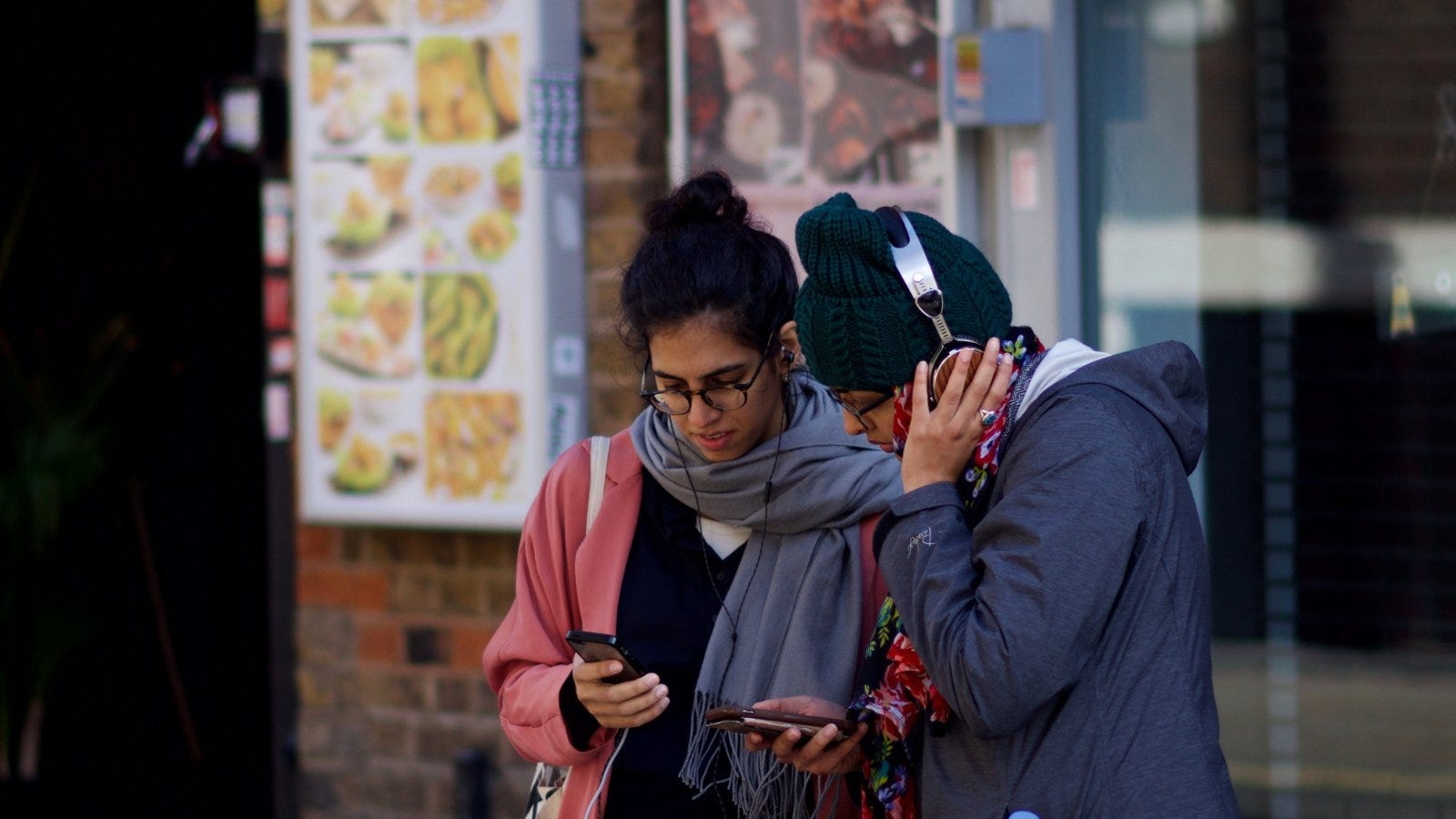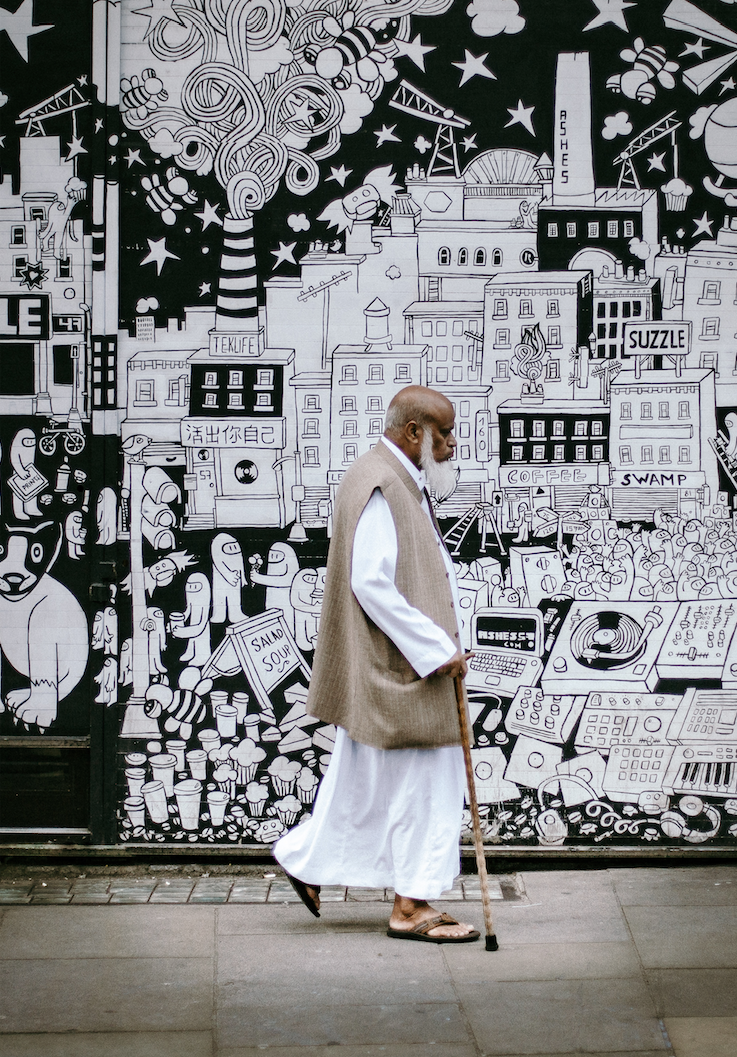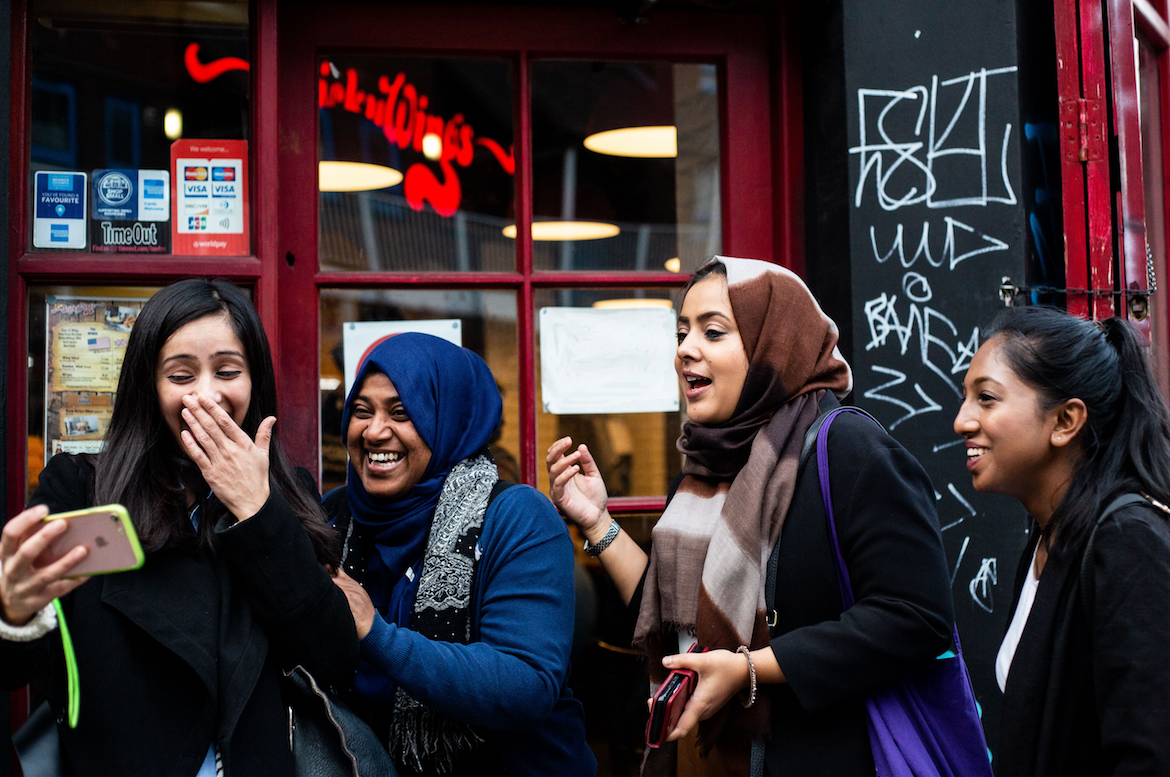‘We Are Shadows’ Brings London’s Brick Lane’s Stories to Your Ears (Review)
A personal tour with the shade of a tour guide


Over in the gently-gentrifying East End of London, there’s a pocket of streets where the vintage-lovers and foodies are flocking. Loosely centered around the base of the Truman Brewery, a warren of markets — textile, secondhand, craftwork, and culinary, all smearing into one another — pitch up tents and compete for the attention of the new crowds flocking in. Both brick-and-mortar as well as mobile businesses are balancing between the influx of new tastes and the local flavor for which the area has been known for decades. Brick Lane in East London has seen a lot of history over not a very long period of time, and, after fighting for a foothold in London, the South Asian community is watching as the rise of their own neighborhood’s success pushes their identity further out of the limelight.
This is the central theme to the experience We Are Shadows: Brick Lane, a collaboration between East End production companies Coney and Tamasha. It’s a lovely way to spend a couple of hours along Brick Lane seeing the area (which is now drowning in hipster-beloved vintage fairs, coffee shops, and Insta-famous pastries) through a different set of eyes than the standard Lonely Planet or Trip Advisor lens. It is a very personal narrative, a tour of Brick Lane through the eyes of its Bengali inhabitants, through mechanics similar to those of a choose-your-own-adventure podcast. Essentially, it’s an augmented reality self-guided walking tour of Brick Lane between Bethnal Green Road and Fashion Street — the experience can be done alone or in small groups, but in order to reap the full benefit all attendees must have their own fully-charged phone and headphones, so any small groups are really just individuals from the same social bubble happening to travel together.
The leather shops and curry houses take on a new historic facet as gentle voices in your ear speak first-person stories about what this family-owned business or that community-sponsored building meant to the residents ten, fifty, one hundred years ago. We Are Shadows is a neighborhood tour without the tour guide, meaning that should any shop or restaurant take your fancy, there’s plenty of time to pop in and out as one pleases, and the narrative is certain to call attention to that fact. It is, after all, a labor of love to the area and would be remiss if it didn’t welcome the chance for visitors to spend their money there.

The experience is unidirectional for roughly the first forty minutes, at which point you can follow the map to one of a dozen or so nearby landmarks or challenge prompts. The tour is conducted via text, pre-recorded phone call, and web browser, so a smartphone with data and a text/call plan is essential. The browser-based interface requires attendees to access at least three landmarks’ audio narratives before being permitted to move toward the final phase of the narrative, though the experience can last as long as attendees choose, up to and including all the points of interest available on the production-tailored map.
Get Shelley Snyder’s stories in your inbox
Join Medium for free to get updates from this writer.
SubscribeSubscribe
The challenge prompts are an invitation for an elevated level of engagement. Rather than passively traveling from point to point to collect audio stories, these are calls to engage with the residents to enrich the experience of the tour: invitations such as entering a store to browse and smell the air while the audio plays, or asking questions of locals who are not part of the tour.
Personally, I’m loath to engage with anyone who is not part of a show, as they haven’t consented to the experience and could become upset by someone they don’t know doing something unexpected to or around them. This is particularly true of London culture, which has proven time and again that most people would rather everyone agree to avoid eye contact and leave each other alone while they travel from point A to point B. This style of invitation to engage in an open-environment public experience usually has the best of intentions at heart, but arguably does stand to cause more collateral damage than it’s worth, especially without a live guide on-site who could perhaps liaise with particular shop owners and ameliorate any misunderstandings.
It’s evident that Coney (having established street cred as interactive theatre creators) are the clock-makers building the support mechanism behind Tamasha’s new and experimental writing for We Are Shadows. I experienced only a couple rough technical faults that could certainly be fixed with a bit more testing: the web browser-based map was a bit glitchy (some points of interest were not accessible on my device) and occasionally the current audio track would terminate shortly before the end. However, I don’t feel that my experience was too negatively affected. I was still able to access the entirety of the narrative and felt the lion’s share of the emotional effect that the production was seeking to generate: a sense of despair at the thought of this community losing its precious foothold, but the resolve that this decline, and the subsequent rise of a new demographic, is part of the evolution of a city over the hundreds or thousands of years it has existed.

We Are Shadows is well-suited toward audience members who prefer voyeurism. Folks seeking the electric feedback of a live performance or the active engagement with an immersive theatre show may be disappointed; there just isn’t enough to keep an audience who craves those goals involved. While there are some clue-seeking calls to action in order to progress the story, there are no performers to engage with, no reward for participation in the invitations to engage (apart from the promise of “a new memory”), and, if an audience member were to choose to leave the Brick Lane area, much of the podcast-style interactive smartphone audio narrative could feasibly continue without hitting any roadblocks to completion. All that said, We Are Shadows is an excellent choice for people who enjoy self-guided tours of famous areas and fans of cultural podcasts with alternate-reality influences. Taking away the flashy marketing term “immersive,” Coney and Tamasha welcome us to their turf with a pleasant and digitally-interactive way to tour a favorite London neighborhood with an impersonal “personal” guide, for less than the cost of a fancy coffee.
We Are Shadows: Brick Lane continues through October 3. Tickets are £3.50.
NoPro is a labor of love made possible by our generous Patreon backers. Join them today!
In addition to the No Proscenium web site, our podcast, and our newsletters, you can find NoPro on Twitter, Facebook, YouTube, Instagram, in the Facebook community Everything Immersive, and on our Slack forum.
Office facilities provided by Thymele Arts, in Los Angeles, CA.